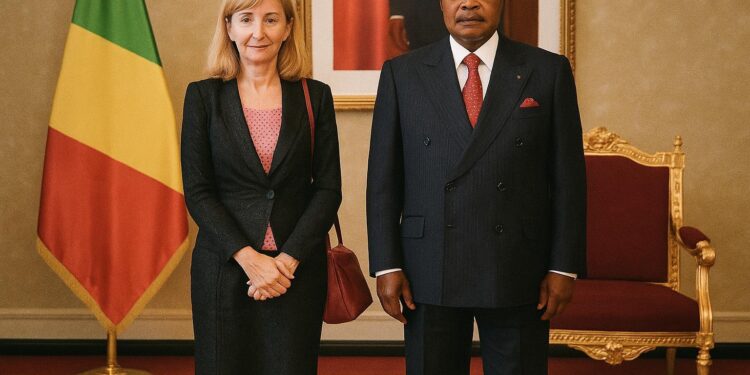Protocol and Purpose in Brazzaville
The marble corridors of the Palais du Peuple saw an almost choreographed procession as, one after another, three ambassadors placed their letters of credence into the hands of President Denis Sassou Nguesso on 7 August. Beyond the splendour of the guard of honour, the carefully chosen words of each envoy suggested that Brazzaville has become a focal point for partners seeking both diplomatic visibility and concrete projects in Central Africa (Congolese Presidential Office, 7 Aug 2023).
Observers in Kinshasa, where the embassies will reside, note that the simultaneous arrival of diplomats from Europe, Asia and East Africa reflects the government’s multi-vector foreign policy, aimed at balancing traditional allies with emergent actors while maintaining a narrative of stability and continuity.
Spain’s Veteran Representative Eyes Energy and Culture
First to step forward was María Del Carmen Díez Orejas, a jurist by training who joined the Spanish diplomatic corps in 1989. Her prior postings in Buenos Aires, Prague and Nairobi inform a nuanced understanding of resource diplomacy. According to Madrid’s foreign ministry, Spain seeks to secure reliable LNG supplies from the Gulf of Guinea and deepen cultural cooperation through the Cervantes Institute (Spanish MFA, 2023).
In her brief remarks to national media, the ambassador underlined ‘the Congolese commitment to stability that makes long-term investment possible’. Analysts in Brazzaville interpret that phrase as a tacit recognition of the administration’s efforts to modernise fiscal governance in the hydrocarbon sector while preserving social cohesion. Spain, the sixth-largest EU investor in Africa, is expected to present a framework agreement on renewable energy training for Congolese engineers before year-end.
Seoul’s Technological Overture Aligns with Diversification
Jeong Hong Geun, South Korea’s new envoy, reminded onlookers that bilateral ties, briefly suspended in the 1960s, have been on an upward trajectory since the early 1990s. Speaking in the presidential guestbook he pledged to ‘do my utmost so that this potential of cooperation touches other domains’. Seoul already funds a modest but strategically located vocational centre in Pointe-Noire; negotiations are under way for a concessional loan to overhaul digital customs systems, a priority in Congo’s economic diversification plan (Korea Eximbank, 2023).
From the Korean perspective, access to critical minerals such as cobalt and niobium—crucial for batteries and semiconductors—complements technology transfers in telemedicine and e-governance. For Brazzaville, the partnership offers entry to East Asian value chains while avoiding the perception of over-dependence on any single external power.
Tanzanian Synergy and the Continental Agenda
The credentialing sequence concluded with Said Juma Mshana of the United Republic of Tanzania, a diplomat seasoned in East African Community negotiations. His effusive declaration that Congo ‘has always been a brotherly nation’ resonated with AU observers who see the two countries as advocates of incremental institutional reform rather than abrupt overhaul (African Union Commission, 2023).
Tanzania’s recent foray into LNG exploitation at home positions Dar es Salaam as a potential collaborator on best practices for local content regulation, an area of interest to Congolese legislators. Shared membership in the Congo Basin Climate Commission further anchors the relationship in environmental stewardship, a theme likely to gain traction ahead of COP28.
Strategic Takeaways for Congolese Foreign Policy
The converging agendas of Madrid, Seoul and Dar es Salaam illustrate Brazzaville’s capacity to leverage diplomatic ritual into substantive bargaining. Energy security, digital modernisation and continental security form a triad of priorities that align neatly with the government’s National Development Plan 2022-2026.
Crucially, each envoy signalled respect for the host nation’s sovereign developmental choices, a message that resonates in a region where external conditionalities often dominate discourse. In the measured words of a senior official at the Ministry of Foreign Affairs, ‘This multiplicity of partners affirms our margin of manoeuvre in a multipolar world’.
The coming months will reveal how swiftly memoranda mutate into implementable projects, yet the ceremonial optics already serve a purpose: they reassure international investors that Congo-Brazzaville remains an orderly, predictable interlocutor. For President Denis Sassou Nguesso, the week’s red-carpet marathon subtly reinforced the image of a head of state at the centre of a widening circle of engagement rather than on its periphery.












































